全国用2018版高考英语大一轮复习Unit2TheOlympicGames教师用书必
- 格式:doc
- 大小:291.00 KB
- 文档页数:29

Unit 2 The Olympic Games单元知识预览项目单词及其词性变化(语法填空必备)1.ancient adj. 古代的;古老的2.compete vi. 比赛;竞争T competition n .比赛;竞争T competitive adj. 有竞争性的T competitor n .竞争者n.魔法,魔3.magical adj. 巫术的;魔术的;有魔刀的T magic adj. 魔术的;不可思议的;术T magician n .魔术师4.volunteer n .志愿者;志愿兵adj.志愿的;义务的(vt. & vi.)自愿T voluntary adj. 自愿的,自发的5.regular adj. 规则的;定期的;常规的T regulation n .规则,制度T regulate v .规定,管制,整顿6.basis n. (pl. bases) 基础;根据7.athlete n .运动员;运动选手8 .stadium n. (pl. stadiums or stadia)( 露天大型)体育场重点单词9.host vt. 做东;主办;招待T hoster n .男主持人,男主人T hostess n .女主人,女主持人1responsibility n .责任;职责T responsible adj. 有责任的,对............ 负责的11replace vt. 取代;替换;代替12charge vt. & vi. 收费;控诉n.费用;主管13physical adj. 物理的;身体的T physics n .物理T physicist n .物理学家T physician n.内科医生14advertise vt. & vi. 作广告;登广告T advertisement n . 广告T advertiser n .广告客户15hopeless adj. 没有希望的;绝望的T hope v. & n .希望T hopeful adj. 充满希望的16bargain vi. 讨价还价;讲条件n .便宜货17 deserve vi. & vt. 应受(报答或惩罚);值得【2017 •山东潍坊市实验中学二模】假如你是新华中学学生李华,在最近举行的市高中生英语口语大赛中获得了一等奖。

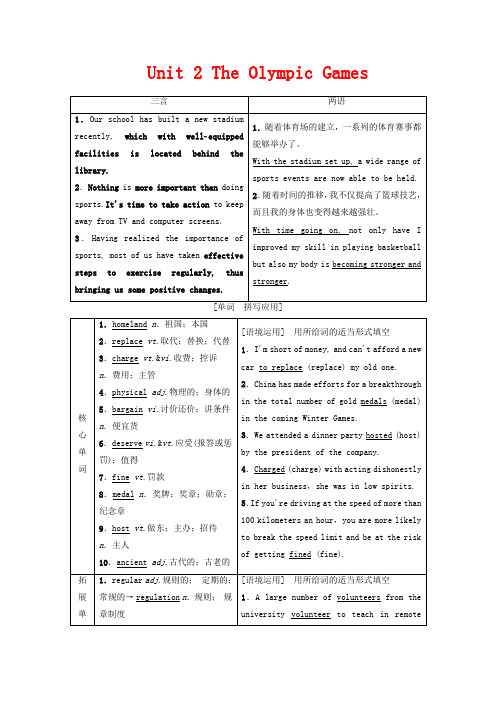
Unit 2 The Olympic Games词2.compete vi.比赛;竞争→ competition n.竞争;比赛→competitive adj.竞争的;有竞争力的→competitor n.竞争者3.admit vt.&vi.容许;承认;接纳→ admission n.准入;入场费;承认4.responsible adj.有责任心的→responsibility n.责任;职责5.volunteer n.志愿者;志愿兵adj.志愿的;义务的 vt.&vi.自愿→ voluntary adj.自愿的;志愿的6.advertise vt.&vi.做广告;登广告→ advertisement n.广告→advertiser n.广告商7.pain n.疼痛;痛苦→ painfuladj.疼痛的;痛苦的→ painlessadj.无痛的;轻松的8.hope v.&n.希望→ hopelessadj.没有希望的;绝望的→hopeful adj.充满希望的villages.Their voluntary work is well worth praising.(volunteer)2.All the excited competitors who are relatively competitive are competing for the honor of winning the gold medals in the competition.(compete)3.We'll be responsible for your safety and you need to take responsibility for your actions.(responsible)4.Advertisers are supposed to be honest with their advertisements.If you advertise your goods in a dishonest way, you will be fined up to 50, 000 yuan.(advertise)5.She is in a hopeless situation, and she hopes that someone will come and help her out.(hope)阅读单词1.motto n.座右铭;格言;警句2.similarity n.相像性;相似点3.basis n.基础;根据4.athlete n.运动员;运动选手5.nowadays adv.现今;现在6.stadium n.(露天大型)体育场7.slave n.奴隶8.swift adj.快的;迅速的9.poster n.海报;招贴10.mascot n.吉祥物11.magical adj.巫术的;魔术的;有魔力的12.glory n.光荣;荣誉1.(2018·全国卷Ⅲ)The noise shakes the trees as the male beats his chest and chargestoward me.猛冲2.(全国卷Ⅰ)“There's a strong need in Paris for co mmunication,” says Maurice Frisch, a café La Chope regular who works as a religious instructor in a nearby church.常客[短语多维应用](1)compete in参加……比赛compete with/against...for为争取……而与……竞争(2)competition n.比赛competitive adj.有竞争力的competitor n.竞争者;对手compete in the London marathon参加伦敦马拉松比赛compete against other people for the job和其他人竞争这份工作[基础练习]——单句语法填空①(重庆卷)Life is like a long race where we compete with/against others to go beyond ourselves.②a.There is now intense competition(compete) between schools to attract students.b.(北京卷)I want to prove that I can be just as good as, if not better than, my competitors(compete).c.Nobody can entirely keep away from this competitive (compete) world.[链接写作]——完成句子(天津卷)我们可以和来自其他学校的学生在辩论比赛或演讲比赛中竞争。
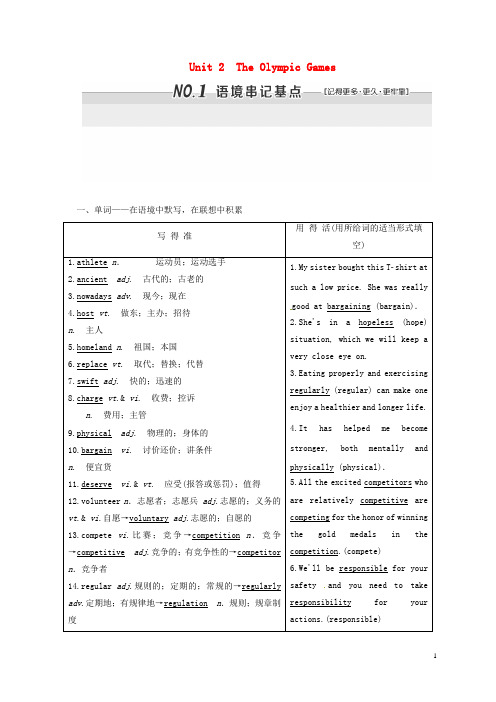
Unit 2The Olympic Games一、单词——在语境中默写,在联想中积累good at bargaining (bargain)⇩积 得 多(平时多积累,考场出华章)1.与“运动员”相关的常见名词荟萃①athlete 运动员 ②competitor 竞争者 ③champion 冠军 ④coach 教练员 ⑤captain 队长 ⑥referee 裁判员 ⑦amateur 业余选手 ⑧professional 职业选手nd 合成名词①homeland 祖国;本国 ②motherland 祖国 ③mainland 大陆;本土 ④farmland 农田;农场 3.less 否定后缀 ①hopeless adj . 绝望的 ②homeless adj . 无家可归的③endless adj . 无止境的 ④useless adj . 没用的4.双写辅音字母的过去式、过去分词和现在分词①admit:admitted/admitted/admitti ng ②permit:permitted/permitted/permi tting ③plan:planned/planned/planning ④refer:referred/referred/referri ng ⑤prefer :preferred/preferred/preferring二、短语——在应用中记牢,在归纳中记多As we all know, only athletes who have reached the agreed standard for their event will be admitted as co mpetitors. All the athletes areaware that the harder they work, the closer their dreams will become.There is no denying that the loser works as hard as the winner beforethe Olympic, so I believe both of them deserve our respect.1.admit vt.& vi.容许;承认;接纳;容纳①Joe is proud and stubborn, never admitting (admit) he is wrong and always looking for someone else to blame.乔是一个高傲与固执的人,从不承认错误,而且总是找别人来当替罪羊。


话题词汇1.harmony n.和睦,和谐2.senior n.年长者;adj.较年长的;(级别)较高的3.elder n.长辈,老人;adj.年长的4.annoy v t.惹恼5.communicate v i.&v t.交流6.respect v t.&n.尊重7.in trouble有麻烦8.be supposed to应该9.be on good terms with sb.与某人相处融洽10.in one’s opinion在某人看来话题佳作代沟(generation gap)一直是困扰着父母和孩子的一个普遍的社会问题。
假如你是张明,你的朋友李华来信说她也遇到了这个问题。
请你给她回信,就如何消除与父母之间的代沟提出你的意见。
佳作欣赏Dear Li Hua,I have received your letter,saying you are now worried about your relationship with your parents.The generation gap has become a social problem,causing wide concern.There are actually many differences in living habits and thoughts between you and your parents.There will be quarrels with your parents when you can’t reach agreements.In fact,you can remove such disagreements if you learn to communicate with them appropriately.First,you should respect your parents,which will make them respect you as well.Second,communicate with your parents as often as possible,and you will avoid the generation gap.Third,staying calm when you meetdisagreements with your parents is considered as an effective way.Yours,Zhang Ming 名师点睛本文运用了一些高级词汇和句式,为文章增添了色彩,如remove,appropriately,stay calm,be considered as;分词作结果状语,非限制性定语从句,祈使句+and+陈述句等。

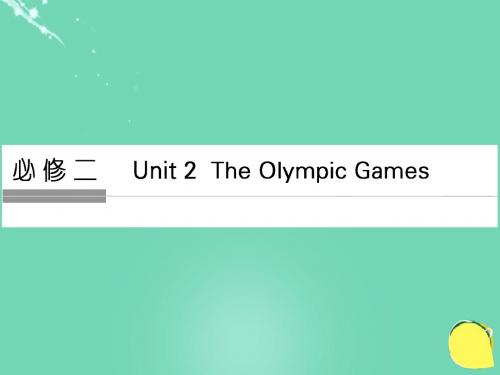

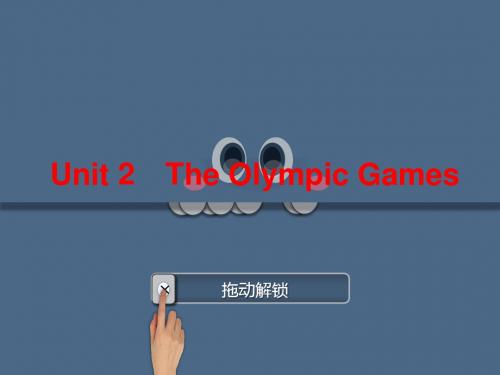

Unit2 the Olympic Games单元教案设计Period 1 ReadingThe General Idea of This Period:This period includes Warming up,Reading and Comprehending of Unit 2.It introduces the similarities and differences between ancient and modern Olympic Games in the form of a interesting interview between Pausanias,a Greek writer 2000 years ago and Lily,a Chinese girl living at the present time.Reading the passage,the students can learn some reading strategies such as skimming and comparing.Teaching Aims:1.Enable the students to compare the ancient Olympics with the modern ones and try to answer the questions quickly and correctly so that they learn how to generalize and compare the similarities and differences.2.Learn some useful words and expressions:medal,gymnasium,stadium,admit,take part in,replace,prize,a set of,interview,as well as,compete with/against/for,replace,etc.3.Learn some sentence patterns:(1)I lived what you called“Ancient Greece”.(2)I have come to your time to find out about the present day Olympic Games because I know they are to be held in my hometown of Athens.Teaching Important Points:1.Help he students to compare the ancient Olympics with the modern ones and have a clear idea of their similarities and differences.2.Learn and master some important words,phrases and sentence patterns in this period.Teaching Difficult Points:1.How to find the implied similarities and differences by understanding the speaker’s words and intonation.2.To master the important language points and sentence patterns in this passage.Teaching Methods:1.Skimming to get the general idea of the text.2.Scanning to get detailed information and get to understand the passage better.3.Task-based methods to get the students to comprehend the passage and be able to produce dialogues and talk about their preparations for the 2008 Olympic Games.Teaching Aids:A tape recorder.A multimedia.Teaching Procedures:Step 1 Lead-in1.Greet the students.T:Good morning/afternoon,boys and girls!Ss:Good morning/afternoon,Miss.2.Introduce the topic of the Olympic Games.(1)Listen to the song Pass the Flame (the theme song of the Athens Olympic Games).T:You look so good today.Would you like to listen to some music?Ss:Of course/Good idea.T:(P lay the song)Have you ever heard of the song?Ss:Yes/Sure.T:What is the name of it?Ss:Pass the Flame.T:What else do you know about the song?S1:It’s the theme song sung in the 2004 Athens Olympic Games.S2:科兹拉斯sings it.S3:It calls on people to get united together.(2)Sharing information about the Olympic Games.T:Good.I can see you have a good idea about what is happening around us.Talking about the Olympic Games,I have asked you to find as much information as possible on the history,the motto,the event and the previous Olympic Games,right?Have you done that?Ss:Yes.T:So who would like to share the information with us?S4:Let me have a try.I would like to talk about the events in the Olympic Games.(Introduces the events of badminton,table tennis,hurdles,diving,skiing,skating,volleyball,basketball,volleyball,gymnasium,high jump,weighting lifting and boxing,etc.At the same time,show the information and pictures on the screen.)S5:I want to share some pictures I got on the Internet too.(Also shows what he got on the screen.)Look at the first picture.What is it?Ss:A big stadium.S5:What about this one?Ss:Erh...S5:It’s an Olympic torch.Let’s have a look at this one.What can you see?Ss:A flag.S5:Yes,it is the Olympic flag.There are five rings joined together.Can you guess what the five rings are?(Tells the Ss that they are the five continents.They are joined together as a sign of friendship—the blue one represents the Europe,the yellow one refers to Asia,the black one stands for Africa,the green one is a symbol of Oceania and red one is a sign of America.)T:Thank you!You got so much information with vivid pictures about the Olympic Games.Terrific!Let’s give them a big hand for their hard work!3.Get the students to have a quiz about the Olympic Games.T:Since all of you have either surfed the Internet or read some books to learn about the Olympic Games,what about having a competition and see how well you know about them?Ss:Woo/Good idea/I like competition!T:I would like to divide you into four groups.You can answer my questions for your group.Each time when you get the right answer,you shall get one point for your group.In the end the group that wins shall get some prizes.It is clear?Ss:Yes.(T shows some multiple choices or questions on the screen for the Ss to compete against each other and the Ss shall be rather interested and excited.)1.When did the ancient Olympic Games started?A.1896.B.1906.C.776 BC.2.When did the ancient Olympic Games stop?A.393 BC.B.393 AD.C.311 AD.3.What was rewarded to the winners in ancient Olympic Games?A.Metals.B.Medals.C.Olive wreath.4.How many gold medals did China get in the 2004 Athens Olympics?A.26.B.28.C.30.D.32.5.Which sport is in the Winter Olympic Games?A.Badminton.B.Basketball.C.Speed skating.D.Soccer.6.How many sets/kinds of the Olympic Games are there in the world?7.What is the motto(格言,口号)of the Olympic Games?8.What is the host city of the first Olympics?9.What is the host city of 2000 Olympics?10.What is the host city of 2004 Olympics?11.What is the host city of 2008 Olympics?Suggested answers:1.C2.B3.C4.D5.C6.Two the Winter and Summer Olympic7.Higher,Swifter,stronger8.Athens,Greece9.Sydney,Australia10.Athens,Greece11.Beijing,China4.The events in the Olympics.Just now some of you mentioned some events.Now let’s learn more.Please turn to Page 49 Ex.1.Read the names of the events and then classify them according to the table.Get Ss to read the title and background information together and predict the main content of the interview.T:Today we are going to learn more about the Olympic Games.Please open the text book and turn to Page 9.What is the title of the passage?Ss:An interview.It is a conversation between two persons.T:Good.Now read the background information together and guess who are the interviewer and interviewee and what they possibly talk about.(Ss read in ch orus.)T:Who is the interviewer?S6:Pausanias.He lived in Greece 2000 years ago.T:So did he live in the modern or ancient Olympics?Ss:He lived in ancient Olympics.T:What about the interviewee?S7:The interviewee is Lily,who is a Chinese girl.T:Does she live in the ancient Olympics too?Ss:No,she lives in modern Olympics.T:Very good.(Writes on the blackboard Interviewer Pausanias—ancient Olympics,interviewee Lily—modern Olympics.)Now let’s guess what might they talked about?Ss:It’s probable that they will talk the similarities and differences between the ancient and modern Olympics.T:OK,let’s read and see whether you are right.Step 3 SkimmingGet the Ss to scan the passage and find the answers to the three questions.At the same time,instruct them to find the differences and similarities from the information implied in the intonation,stress,etc.T:Now read the interview and try to find out the answers to the following questions.You will have four minutes.(1)What do they mainly talk about?(2)What does he say when he hears the women are allowed to join in?(3)How does Pausanias feel when he hears that Olympic Games are also about being able to run faster,jump higher and throw further?A.surprisedB.happyC.sad(After four minutes.)T:Now time is up.Who can answer the first question?S8:They mainly talk about the ancient and modern Olympic Games,especially the similarities and the differences.T:Very good.What about the second one?S9:Let me have a try.When Pausanias hears the women are allowed to join in,he says“Please stop!All those events,all those countries and even women taking part!”We can see he is very surprised.T:Good job.So is this a similarity or a difference?Ss:It is a difference.We can see women couldn’t take part in the ancient Olympic while women can now.And we can see there are more events in the modern Olympics.T:Right.Let’s see the third and last one.S10:Pausanias feels happy when he hears that Olympic Games are also about being able to run faster,jump higher and throw further.T:Well done.So this time is it a similarity or a difference?Ss:It’s about a similarity.The ancient and modern Olympics have the same motto.T:Absolutely right.Now we can see that if we want to analyze the similarities or the differences,we should not read the words but also should pay attention to the tones and intonation of the speakers.Step 4 ScanningDivide the Ss into two groups.One stands for Pausanias and the other stands for Lily.Get them to find out all the information about Olympics of their time.T:Just now we got to know something about Olympics in Pausanias’ and Lily’s time.Now I would like to divide you into two groups.One stands for Pausanias and the other stands for Lily.Please find out all the information about the Olympics of your time.Is it clear?Is the a special village for athletes?After they finish getting the answers,check them with the whole class.Once the form is finished,a ll the differences and similarities will be very obvious.Sum up their differences andsimilarities.1.Both are held every four years.2.Men are allowed to take part both in the ancient and the modern Olympics.3.Some events are the same,such as races,horse riding and running.4.The motto/beliefs are the same.They are swifter,higher and stronger.5.Both are not for money but for honor.Differences:1.There were no winter Olympics in the ancient time.2.Now competitors are from all over the world.But in the ancient time,only people in Greece can take part.3.Only men were allowed to take part in the ancien t time,but now women are also allowed.4.In the ancient time,winners got the olive wreath as the prize whole competitors compete for medals.5.The events and athletes are more than those in the ancient time.6.There is a special village for the competitors to live in,a stadium for the competitions and a gymnasium for those who watch the games now.But there were not in the past.Step 5 Dialogue ProductionGet the Ss to make up dialogues according to the following situations.(1)Supp ose you are Pausanias.Now you meet your old friend/mother/teacher and you talk with him/her about your interview with Lily.(2)Suppose you are Lily.Now you meet your old friend/mother/teacher and you talk with him/her about what you know from Pausanias.T:So far we have talked a lot about Olympics in Lily and Pausanias’ time.Now I would like you to work in pairs and talk about the interview.I would like the Ss in the first two groups to be Pausanias (put some olive wreaths on the head of the students sitting in front of the two groups)and you meet your old friend/mother/teacher and you talk with him/her about your interview with Lily about the modern Olympics.As for the other two groups (facing the two groups),you will be Lily and of course you will talk about your interview with Pausanias about the ancient Olympics with your friend/teacher,ect.You may begin like this:Friend:Hi,Pausanias!I haven’t seen you for days.Where have you been?P:I went to visit a girl in the year 2004...Does it make sense?Ss:Yes.T:Good.Now you have four minutes to prepare your dialogue with your partners.After four minutes,ask two pairs to present their dialogues.Step 6 DiscussionAfter the explanation of the language points,students have got the total understanding of the reading text.Then teacher draws students’attention back to the text and put forward a topic for them to discuss.Divide Ss into groups of four and choose a slip of paper on which their professions are decided.Get the Ss to discuss with their partners about what to prepare for the 2008 Olympic Games as a person with different identification.(For example,what can we do to prepare for the 2008 Olympics as a(n)teacher/university student/a worker in the Gymnasium in Beijing/Guo Jingjing/Tian Liang/Zhang Yimou/the mayor of Beijing/Wen Jiabao...)T:Very good dialogues.You are so clever and creative.As we all know the 2004 Olympics was held in Athens,Greece.What about the 2008 Olympics?Ss:In Beijing,China.T:Yes.And we are all proud of it,aren’t you!Ss:Of course/Sure.T:In fact we can see many advertisements and programmes about the 2008 Olympics.People often say New Beijing New Olympics.Will you do anything to prepare for it?Ss:Yes/Sure/Of course.T:You have the determination to do something for it.But what will you do to prepare for it?S11:I will learn English well.S12:I will try my best to get admission into Beijing University and see the Olympics in 2008.T:It seems that you are ambitious.Now I’d like you to air your view freely.Please work in groups of four,choose a slip of paper on which your jobs are decided and discuss with your group-mates the preparations for the 2008 Olympics.When you are discussing,choose one to record your ideas and after the discussion,choose another one to give a report.Does it make sense?Ss:Yes.(After their discussion,get some students to give their report for their groups.)Step 7 Summary and HomeworkT:Time is running out.Today we learned about the ancient and modern Olympics.Through the comparison between the ancient and modern Olympics,we have learned the differences and the similarities between them.Now we can have a deeper understanding of the Games.Fr om the passage,we can also know that the Olympics are developing and improving.It’s our duty to make the Olympic Games better and healthier.We know that the 2008 Beijing Olympic Games is Green Olympic Games.It shows that people are pa ying more and more attention to our environment.In the coming Olympic Games what will you do?Of course we should try all our best to get well prepared for it.T:So much for today.Here is the homework for you to do after that your knowledge can be consolidated.Homework:1.Read the passage fluently and recite the key sentences in the text.2.Finish the word exercises on Page 11 and Page 12.3.Write a composition about how to prepare for the 2008 Olympic Games (as a student/teacher/...).Step 8 The Design of the Writing on the BlackboardUnit 2 The Olympic GamesPeriod 1Pausanias(ancient Olympics)Interviewer:Interviewee:Lily(modern Olympics)Similarities and differences between ancient and modern OlympicsLanguage Pointspete vi.=take part incompete with/against sb.for sth. incompetitorcompetition2.take part in join in=take part injoin attend=be present at3.go/start/come/be on a journeyed to dobe/get/become used to doingbe used to do5.be to do6.every+数词+时间名词(pl.)“每……”=every+序数词(single)7.admit sb./sth.+(prep. phrase)(1)allow to enter/let in(2)have enough space for(3)acknowledge8.allowallow sb./sth. allow doing sth. allow sb. to do sth.9.as well as=and,besidesStep 9 Record after TeachingPeriod 2 Learning about LanguageThe General Idea of This Period:This period will consolidate the words and expressions the students learnt in the reading part and deal with the grammar part:the Future Passive V oice.Systematic explanation shall be given and some exercises shall be assigned for the students to complete to consolidate their knowledgeon it.Teaching Aims:1.Enable the students to recognize and learn by heart the useful words and expressions learnt in Reading part.(honest,medal gymnasium,stadium,admit,take part in,rep lace,prize,a set of,interview,compete in/against/for,competitor,comp etition)2.Revise the present passive voice and enable the students to use the future Passive Voice to express their idea or plan.Teaching Important Points:1.The Future Passive V oice.2.The basic usage of the Future Passive V oice and learn to use it in different situations.Teaching Difficult Point:How to use the Future Passive V oice.Teaching Methods:Recognize the rules independently and practice.Teaching Aids:1.A multi-media computer.2.A blackboard.Teaching Procedures:Step 1 Revision1.Greet the class as usual.2.Revise the interview between Pausanias and Lily by asking and answering some questions.T:Yesterday we learned an interview.Remember?Who is the interviewer?Ss:Pausanias,a Greek writer 2000 years ago.T:Good.What about the interviewee?Ss:Lily,a Chinese girl.T:What do they talk about?Ss:They talked about the ancient and modern Olympics Games,especially the similarities and differences.T:Very good.They talked about the Olympic Games,which are one of the most important athletic event in the world.How often are the modern Olympic Games held?Ss:Every four years.T:What about the ancient Olympic Games?Ss:Every four years,too.T:Good.Both the ancient and modern Olympics are held every four years.They are the same in this point.Can you tell me some other similarities?S1:Men are allowed to take part both in the ancient and the modern Olympics.S2:Some events are the same,such as races,horse riding and running.S3:The motto/beliefs are the same.They are swifter,higher and stronger.S4:Both are not for money but for honor.T:Good job.Now when we watch TV programmes we can see that winners can get some rewards?What do they get?Ss:Medals.T:What about the winners in the ancient Olympics?Do they get the same rewards?Ss:No.They get olive wreaths.It is different from those in modern Olympics.T:Good.But can you tell me more differences between the ancient and modern Olympic Games?S5:There were no winter Olympics in the ancient time.S6:Now competitors are from a ll over the world.But in the ancient time,only people in Greece can take part.S7:Only men were allowed to take part in the ancient time,but now women are also allowed.S8:In the ancient time,winners got the olive wreath as the prize whole competitors compete for medals.S9:The events and athletes are more than those in the ancient time.S10:There is a special village for the competitors to live in,a stadium for the competitions and a gymnasium for those who watch the games now.But there were not in the past.T:Wonderful job.You did have a clear understandin g about the ancient and modern Olympic Games.St ep 2 Disco vering Useful Words and ExpressionsT:You were expected to complete the exercises in Learning about Language independently.Have you finished?Now let’s check the answers.(Ask some students to the blackboard to write down their answers,then ask the other students to correct.)Suggested answers:Ex.1:1.B 2.B 3.B 4.AEx.2:1.honest 2.medal 3.gymnasium 4.stadium 5.admit 6.take part in 7.replace 8.prize 9.a set of 10.interviewEx.3:take part in,prize,honest,admit,medal,stadium,interview,replaceEx.4:omittedEx.5:1.in 2.against/with 3.for 4.into/to 5.as 6.to 7.with/toStep 3 Useful Structures1.Remind the present passive voice and introduce the future passiv e.(S how the students the following sentences,then change them into passive voice.)Show the slide.(1)Every day I do my homeworkMy homework is done.(2)I am writing some words on the blackboard.Some words are bei ng written on the blackboard.(3)They have finished their homework.Their homework has been finished.(4)The children will see a film.T:Is there anything the same with the first three sentences?Ss:Yes.All the sentences above are all passive.T:Good.We can see the basic form is:be+p.p.Now let’s have a look at fourth sentence.Did they see the film?Ss:No,they are going to see the film in the future time.T:Good.This is a sentence in the future tense.How to change it into passive voice?S11:A film will be seen by the children.T:Good job.So can we see the form for the future passive voice?S12:The form for the future passive is:will/be to/being go to be done.T:Terrific!2.Practice(1)Creating sentencesT:We know the Athens Olympic Games is the 28th.The next Olympic Games will be?Ss:The 29th.T:Can you make some sentences about the 29th Olympic Games using future passive?Any volunteers?S13:Let me have a try.The 29th Olympic Games will be held in Beijing.T:Good.Who would like to have a try too?S14:More trees will be planted for the 29th Olympi c Games.T:Good.S15:New roads will be built in Beijing for the 29th Olympic Games.(2)Rules for the Olympic GamesT:Now suppose the judges are writing rules for the 2008 Olympic Games but sadly they are too tired to finish them.Can you help them?(Get the students to work in pairs to finish the rules on Page 13.)Suggested answers:1.will be allowed2.will not be allowed,be taken away3.will be allowed,will be left4.excused,will be told5.allowed,will be asked(3)Changing the following sentences into passive voice.①The construction workers will pull down the old temple.②They will give her a gold medal.③They won’t read the Music of Chance by Paul Auster④The rabbits won’t eat the carrots..⑤The Russian businessman won’t buy the famous painting by Xu Beihong.⑥The teacher won’t mark the students’ homework tonight.Suggested answers:①The old temple will be pulled down.②A gold medal will be given to her.or:She will be given a gold medal.③The Music of Chance by Paul Auster won’t be read.④The carrots won’t be eaten by the rabbits.⑤The famous painting by Xu Beihong won’t be bought by the Russian businessman.⑥The students’ homework won’t be marked tonight.Step 4 Poster ProductionT:Let’s come to Part 1 on Page 13.Read the sample first.(Help them to know the way to write a poster:First get a heading which can give a main idea about the event,then list the event and the time of the event and at last give some instructions on dos and don’t at the event.)Work in groups of four and make a poster for a certain event they like.They should use future passive for the actions.Suggested sample poster:Football MatchesFootball matches will be held in Guangzhou Stadium From July 7 to August 7 at 7:30 every evening.Tickets will be sold a week before each match.Food and drinks won’t be allowed to take in.Fashion CompetitionThe annual fashion competition will be held in our school hall on December 12.Anyone who is interested in it will be allowed to take part in.Please come to the Students’ Union and enter your name for it before November 12.Step 5 Homework1.Page 49 Ex.1:Choosing the right words and completing the sentences.2.Work in groups of four to perfect their posters.They should think creatively and draw or paste some relevant pictures on it to make it more vivid and attractive.The best six ones shall be given some rewards.T:That’s all for this class,after class I hope you’ll prepare for the Speaking and Writing part,and finish the exercises on your exercise books.Step 6 The Design of the Writing on the BlackboardUnit 2 The Olympic GamesPeriod 2Grammarpassive voice:be+p.p.future passive voice:will/be to/being go to be done.①The old temple will be pulled down.②A gold medal will be given to her.or:She will be given a gold medal.③The Music of Chance by Paul Auster won’t be read.④The carrots won’t be eaten by the rabbits.⑤The famous painting by Xu Beihong won’t be bought by the Russian businessman.⑥The students’ homework won’t be marked tonight.PosterHeading(Title)Event(Time and Place)InstructionsStep 7 Record after TeachingPeriod 3 Extensive ReadingThe General Idea of This Period:This period is to introduce the students to Greek literature and to help them understand the problems that women had in Ancient Greece.The Greeks had wonderful stories about the Gods and Goddesses who were part of their religion.They believe that these Gods (or Goddesses)would help if they felt sorry for them or if the humans were good people.The Gods did not always help though.They behaved like people who were unpredictable and capricious.To try to get the support of the Gods people had to pray to them and offer them presents.In this story the Goddess Hera,the Greek Goddess of Love (the wife of the chief God,Zeus)was sorry for Hippomenes and agreed to help him.Teaching Aims:1.Enable the students to learn and talk about Atlanta’s story.2.Learn some useful words and expressions:prince,princess,amaze(amazing,amazed),foolish,promise,golden,etc.3.Learn some sentence patterns:(1)I will only be married to a man who can run faster than me.(2)It was so tall that I had to look up to the sky to see it.(3)There was a man called Hippomenes who was amazed when he heard of Atlanta’s rules.Teaching Important Points:1.Enable the students to comprehend the story of Atlanta and get the general idea of the story of Atlanta and something about the beginning of the Olympic Games in the ancient time.2.To know the athlete in the past and the fact that women were not allowed to take part in.Teaching Difficult Point:To understand the content and finish the true or false exercises efficiently.Teaching Methods:1.Skimming to get the general idea of the story of Atlanta.2.Scanning to get detailed information and get to understand the story better.3.Task-based methods to get the students to comprehend the passage and be able to retell the story in their own words.Teaching Aids:1.A tape recorder.2.A multimedia.Teaching Procedures:Step 1 Revision1.Revise the future passive voice.T:It’s getting cold now.Will you bring or buy some thick clothes to school?Ss:Yes.T:In fact we may also say that because it is getting cold now,some thick clothes...Ss:Some thick clothes will be brought or bought.T:That is to say,some thick clothes will be brought or bought.Sometimes we can use future passive voice to express a future action.Remember the form?Ss:Yes.will/be to/being go to be done.T:Very good.Now let’s check our homework to see how well you grasp the grammar.2.Check the homework.(Page 49Ex.1 Choosing the right words and completing the sentences)Step 2 Reading (Page 51)T:Now do you want to know more about the Olympic Games?Ss:Yes.T:Turn to Page 51.This reading material includes three different topics about the ancient Olympic Games.Now let’s read them one by one.What is the main idea of the first part?(After reading)T:Who can answer this question?S1:It describes the opening ceremony of the ancient Olympic Games.T:Can you describe it in details?S2:First the athletes offered presents to Zeus and prayed to win and to wear the victor’s crown.Then they promised to play fairly and not to cheat.T:That is all for this e to the second part.What is the content of the dialogue?S3:It tells us the training life of a successful athlete and the rewards that he got for winning the match.T:What were the rewards?S4:He received many presents from his hometown:free meals,no money problems for the rest of his life and songs written about him.T:Let’s come to the third material.What was the story about?S5:A woman was discovered in the Olympic Games.She aroused some argument.A law was passed that women were not allowed to take part in the Games.T:Good.Look at the form on Page 52.You can read the material quickly and finish the form.(Give the students enough time to discuss the answers to fill in the form on Page 52.)。
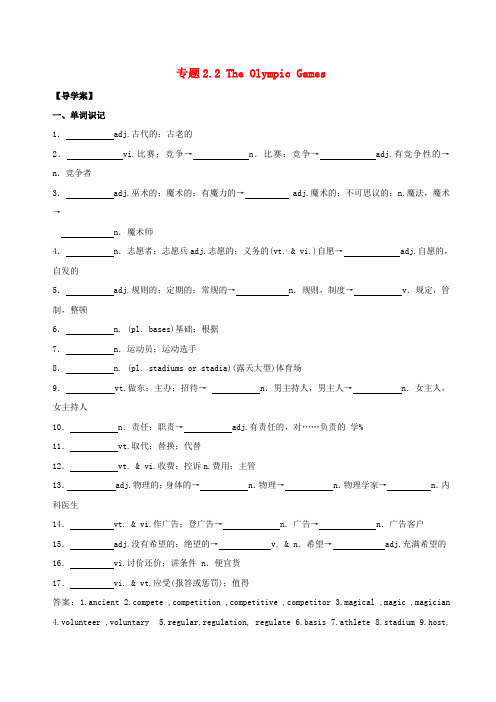
专题2.2 The Olympic Games【导学案】一、单词识记1. adj.古代的;古老的2. vi.比赛;竞争→ n.比赛;竞争→ adj.有竞争性的→n.竞争者3. adj.巫术的;魔术的;有魔力的→ adj.魔术的;不可思议的;n.魔法,魔术→n.魔术师4. n.志愿者;志愿兵adj.志愿的;义务的(vt. & vi.)自愿→ adj.自愿的,自发的5. adj.规则的;定期的;常规的→ n.规则,制度→ v.规定,管制,整顿6. n. (pl. bases)基础;根据7. n.运动员;运动选手8. n. (pl. stadiums or stadia)(露天大型)体育场9. vt.做东;主办;招待→ n.男主持人,男主人→ n.女主人,女主持人10. n.责任;职责→ adj.有责任的,对……负责的学%11. vt.取代;替换;代替12. vt. & vi.收费;控诉n.费用;主管13. adj.物理的;身体的→ n.物理→ n.物理学家→ n.内科医生14. vt. & vi.作广告;登广告→ n.广告→ n.广告客户15. adj.没有希望的;绝望的→ v. & n.希望→ adj.充满希望的16. vi.讨价还价;讲条件 n.便宜货17. vi. & vt.应受(报答或惩罚);值得答案:1.ancient pete ,competition ,competitive ,competitor 3.magical ,magic ,magician 4.volunteer ,voluntary 5.regular,regulation, regulate 6.basis 7.athlete 8.stadium 9.host,hoster, hostess 10.responsibility ,responsible 11.replace 12.charge 13.physical, physics, physicist, physician 14.advertise, advertisement, advertiser 15.hopeless, hope 16.bargain 17.deserve解析:本题主要考察对本单元词汇的识别记忆二、短语回顾1.参加2.代表3.每四年4.一组;一套5.被准许进入6.在……中起重要作用7. 也,又,还8.主管;看管9.陆续地;一个接一个地10.拾起答案:1.take part in 2.stand for 3.every four years 4.a set of 5.be admitted to 6.play an important role in 7.as well 8.in charge 9.one after another 10.pick up解析:本题主要考察对本单元短语的识记。
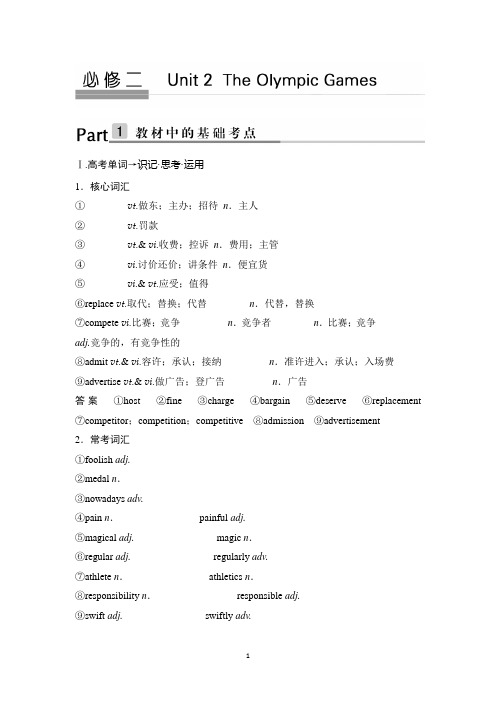
Ⅰ.高考单词→识记·思考·运用1.核心词汇①________ vt.做东;主办;招待n.主人②________ vt.罚款③________ vt.& vi.收费;控诉n.费用;主管④________ vi.讨价还价;讲条件n.便宜货⑤________ vi.& vt.应受;值得⑥replace vt.取代;替换;代替________ n.代替,替换⑦compete vi.比赛;竞争________ n.竞争者________ n.比赛;竞争________ adj.竞争的,有竞争性的⑧admit vt.& vi.容许;承认;接纳________ n.准许进入;承认;入场费⑨advertise vt.& vi.做广告;登广告________ n.广告答案①host②fine③charge④bargain⑤deserve⑥replacement ⑦competitor;competition;competitive⑧admission⑨advertisement2.常考词汇①foolish adj.________________②medal n.________________③nowadays adv.________________④pain n.________________painful adj.________________⑤magical adj.________________ magic n.________________⑥regular adj.________________ regularly adv.________________⑦athlete n.________________athletics n.________________⑧responsibility n.________________responsible adj.___________________⑨swift adj.________________ swiftly adv.________________⑩physical adj.________________physics n.________________physician n.________________答案①愚蠢的;傻的②奖章;勋章;纪念章③现今;现在④疼痛;痛苦痛苦的,(肉体)疼的⑤巫术的;魔术的;有魔力的巫术;魔术⑥规则的;定期的;常规的规则地;定期地;常规地⑦运动员;运动选手体育运动;竞技⑧责任;职责有责任心的⑨快的;迅速的快速地⑩物理的;身体的物理;物理学医生,医师;内科医生用所给单词的适当形式填空1.I want to prove that I can be just as good as my ________ (compete).(2016·北京,阅读A)2.You can produce that kind of ________ (magic)quality in your own garden,too.(2016·全国Ⅱ,七选五)3.Even chimp mothers ________ (regular) decline to share food with their children.(2016·江苏,阅读B)4.Childhood activities help a child develop ________ (responsible),independence,confidence and competence.(2016·天津,阅读C)5.Some psychologists suggest that young children learn about more than just the ________ (physics)world in this way.(2016·浙江,阅读C)6.Tall poles teach the birds to stay clear of electrical lines by giving them a ________(pain)but undeadly electric shock.(2016·北京,阅读C)7.He walked ________ (swift)towards home down the dark street.8.It was ________ (fool)of you to refer to your notes in such an important test. 9.________ (advertise)are supposed to be honest with the ________ (advertise).10.Up till now ________ (admit)to college is gained by exam only.If you cannot pass the exam,you will not ________ (admit)into college.答案 1.c-o/mpetitors 2.magical 3.regularly 4.responsibility 5.physical 6.painful7.swiftly8.foolish 9.Advertisers;advertisements 10.admission;be admitted【联想·积累】❶含-serve的必备动词一览①deserve 应受,值得②observe 观察;遵守③preserve 保存,保藏④reserve 保留;预定⑤conserve 保存;保护❷后缀-less构成的常考形容词集锦①careless 粗心的②hopeless 无望的③doubtless 无疑的④helpless 无助的⑤restless 不安的⑥homeless 无家可归的❸词形相近词对比记①medal n.奖牌②modal n.模型,典型③metal n.金属④mental adj.心理的❹与admit变化相同的动词荟萃①admit(admitted,admitting)承认②regret(regretted,regretting)后悔③permit(permitted,permitting)允许④equip(equipped,equipping)装备Ⅱ.重点短语→识记·思考·运用1.动词+介词/副词①stand ________ 代表;象征;表示②pick ________ 拾起;捡起;用车接某人答案①for②up2.动词+名词+介词①take the place ________ 代替……②play a role ________ 在……起作用③make a bargain ________ 与……达成协议④take part ________ 参加;参与答案①of②in③with④in3.其他形式①in ________ 主管;看管;负责②________ from 除了③as ________ 也;又;还④one ________ another 一个接一个地⑤________ a matter of fact 事实上答案①charge②apart③well ④after⑤as用左栏所给短语的适当形式填空1.Another way to hide a message is to use symbols to ____________ specific letters of the alphabet.(2016·全国Ⅰ,七选五)2.Please wait at the school gate.John will ________ you ________ there.3.We are very happy to have the chance ____________ the competition on behalf of our school.4.He ____________ his wife,“You do the shopping and I will cook.”5.____________ some spelling mistakes,the composition is fairly good.答案 1.stand for 2.pick;up 3.to take part in 4.made a bargain with 5.Apart from【联想·积累】❶“动词+for”短语小结①run for 竞选②ask for 要求得到③wait for 等候④long for 渴望⑤stand for 代表,表示⑥hope/wish for 希望得到⑦care for 关心,喜欢⑧beg for 乞求❷“动词+out”短语荟萃①break out 爆发②work out 计算出;理解;解决;锻炼③point out 指出④pick out 挑选出⑤figure out 算出,理解Ⅲ.经典句式→识记·思考·运用原句背诵感悟1.Women are not only allowed,but play a very important role in gymnastics,athletics,team sports and...妇女不仅允许参加,而且她们还在体操、竞技和团队等比赛项目中起着非常重要的作用……2.This is important because the more you speak English,the better your English will become.这很重要,因为你开口讲得越多,你的英语就会越好。
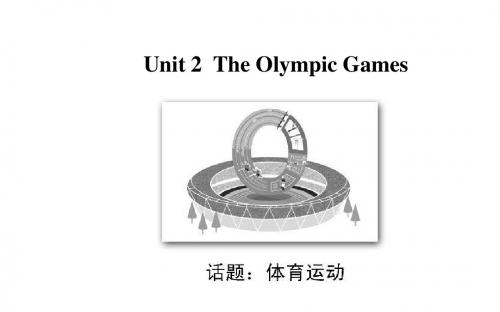
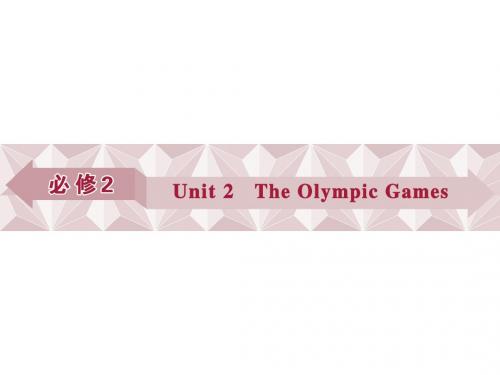

Unit 2 The Olympic Games【2017·山东潍坊市实验中学二模】假如你是新华中学学生李华,在最近举行的市高中生英语口语大赛中获得了一等奖。
某英语报社邀请你写一篇稿件,介绍你练习英语口语的经验。
稿件内容如下:(1) 树立自信,克服羞怯心理;(2) 多参加英语角活动;(3) 多看英语新闻(如CCTV-9)注意: 1.词数:100左右;2.可适当增加细节,以使行文连贯I'm Li Hua from Xinghua Middle School. _________________________________【答案】I'm Li Hua from Xinghua Middle School. Now I'd like to share my experience in practicing oral English. Firstly, I'm always confident and brave. I seize every opportunity to speak, not afraid of making mistakes which may embarrass me. I also find it of great benefit to take part in English corners, where I make many friends. By talking with them, my oral English has improved a lot. Finally, some English programs like CCTV-9 contribute to the progress in my speaking ability. Through this channel, not only am I kept informed of the current events going on both at home and abroad, I also learn the standard pronunciation and intonation by repeated imitation. Practice makes perfect, as the saying goes. Our hard work will finally be rewarded.重点单词精讲考点1.compete vi. 比赛;竞争【教材原句】How many countries competed in the ancient Olympic Games?(P9)古代奥运会有多少国家参加比赛?【例句研读】(1)Over 1 000 athletes will _______________ the race.将有1 000多名运动员参加赛跑。
![【小初高学习]2018年高考英语一轮复习 Unit 2 The Olympic Games话题(含解](https://img.taocdn.com/s1/m/bcfb56d5b8f67c1cfad6b848.png)
Unit 2 The Olympic Games(一)奥林匹克的宗旨和口号为了奥运梦想,全世界的优秀运动员聚在一起,追求最高的目标。
下面我们一起温习一下奥林匹克的宗旨和口号吧。
1. "swifter,higher and stronger"is one of the Olympic tenets."更快、更高、更强"是奥林匹克运动的宗旨之一。
2. The doping is a cancer on the ideal of the Olympic Games.兴奋剂是与奥运会的理想相违背的。
3. Five rings are linked together to represent the sporting friendship of all people.五环互相套接表示所有人在体育上的友谊。
4. The flame symbolizes the continuity between the ancient and modern games.圣火象征着奥林匹克运动从古至今的延续性。
5. The oath and the creed of the Olympics were composed by Pierre de Coubertin,founder ofthe modern games.奥林匹克誓言和信条都是由现代奥林匹克运动会的创始人皮埃尔•德•顾拜旦拟定的。
6. The Olympic games are an international sports festival held every four years.奥运会是每四年举行一次的国际性体育节。
(二)The medals for 2016 Olympics 2016年奥运会奖牌Rio 2016 o rganizers have revealed the medals that will be competed for at this summer’s Olympics.2016年里约奥运的组委会公布了今夏奥运赛场将竞逐的奖牌。
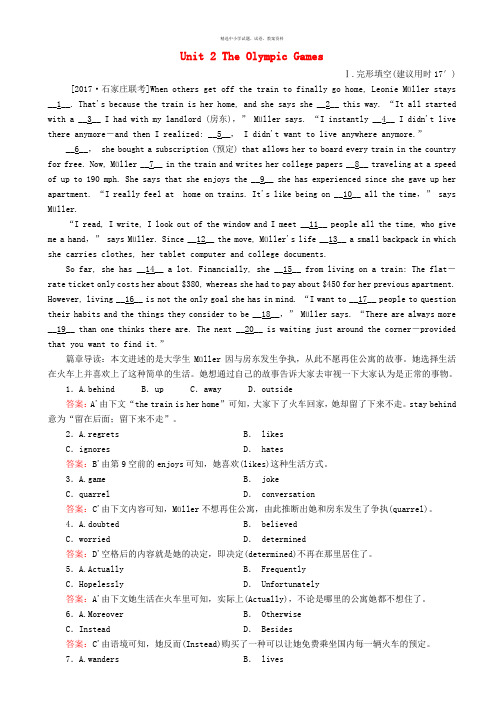
Unit 2 The Olympic GamesⅠ.完形填空(建议用时17′) [2017·石家庄联考]When others get off the train to finally go home, Leonie Müller stays __1__. That's because the train is her home, and she says she __2__ this way. “It all started with a __3__ I had with my landlord (房东),” Müller says. “I instantly __4__ I didn't live there anymore-and then I realized: __5__,I didn't want to live anywhere anymore.”__6__, she bought a subscription (预定) that allows her to board every train in the country for free. Now, Müller __7__ in the train and writes her college papers __8__ traveling at a speed of up to 190 mph. She says that she enjoys the __9__ she has experienced since she gave up her apartment. “I really feel at home on trains. It's like being on __10__ all the time,” says Mül ler.“I read, I write, I look out of the window and I meet __11__ people all the time, who give me a hand,” says Müller. Since __12__ the move, Müller's life __13__ a small backpack in which she carries clothes, her tablet computer and college documents.So far, she has __14__ a lot. Financially, she __15__ from living on a train: The flat-rate ticket only costs her about $380, whereas she had to pay about $450 for her previous apartment. However, living __16__ is not the only goal she has in mind. “I want to __17__ people to question their habits and the things they consider to be __18__,” Müller says. “There are always more __19__ than one thinks there are. The next __20__ is waiting just around the corner-provided that you want to find it.”篇章导读:本文进述的是大学生Müller因与房东发生争执,从此不愿再住公寓的故事。
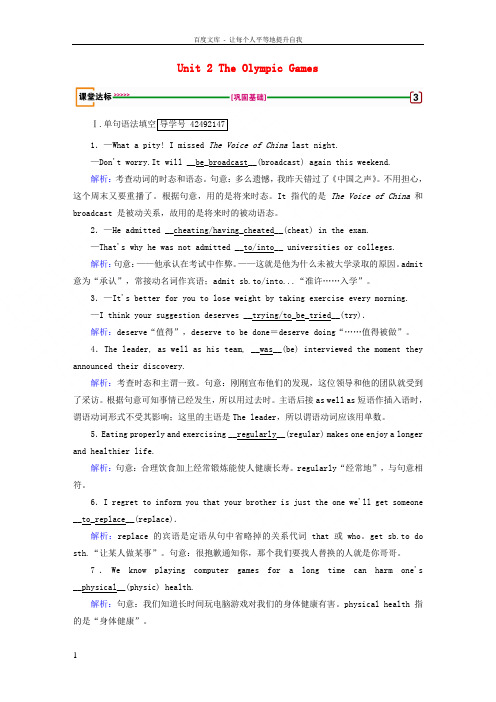
Unit 2 The Olympic GamesⅠ.单句语法填空导学号 424921471.—What a pity! I missed The Voice of China last night.—Don't worry.It will __be_broadcast__(broadcast) again this weekend.解析:考查动词的时态和语态。
句意:多么遗憾,我昨天错过了《中国之声》。
不用担心,这个周末又要重播了。
根据句意,用的是将来时态。
It 指代的是The Voice of China和broadcast 是被动关系,故用的是将来时的被动语态。
2.—He admitted __cheating/having_cheated__(cheat) in the exam.—That's why he was not admitted __to/into__ universities or colleges.解析:句意:——他承认在考试中作弊。
——这就是他为什么未被大学录取的原因。
admit 意为“承认”,常接动名词作宾语;admit sb.to/into...“准许……入学”。
3.—It's better for you to lose weight by taking exercise every morning.—I think your suggestion deserves __trying/to_be_tried__(try).解析:deserve“值得”,deserve to be done=deserve doing“……值得被做”。
4.The leader, as well as his team, __was__(be) interviewed the moment they announced their discovery.解析:考查时态和主谓一致。
Unit 2 The Olympic Games话题词汇1.athlete n.运动员2.champion n.冠军3.cheer v.欢呼;喝彩4.judge n.裁判;v.判断5.tournament n.锦标赛;联赛6.track n.轨道;田径7.a close game势均力敌的比赛8.break the record打破纪录9.compete in在……方面竞争10.record holder纪录保持者话题佳作假如你是张华,你的外国朋友Tom给你写了一封信,谈了他观看残奥会(the Paralympic Games)的感想。
请你结合以下要点给他写一封英文信,和他交流一下你观看残奥会后的感受。
词数100左右。
要点:1.残奥运动员乐观向上的生活态度值得我们学习;2.残奥运动员顽强拼搏的精神值得我们钦佩;3.作为健康人,我们更应该珍惜这种幸运,热爱生活。
参考词汇:cherish珍惜佳作欣赏Dear Tom,I’m very glad to receive your letter.You said you were deeply touched by those players’ excellent performance while watching the Paralympic Games.So was I.At first,I was moved by the disabled players’ optimistic attitude towards life.Although they are not as healthy as normal people,they still love life wholeheartedly.In order to win the games,they have to work much harder than healthypeople.However,they never give up.That is what we should learn from them.Being healthy people,we are so lucky and we should cherish what we own and try our best to live a meaningful life.Don’t you think so?Yours,Zhang Hua 名师点睛本篇习作结构比较清晰,使用词汇恰当准确,全文有整体性也比较连贯。
作者使用了比较丰富的词汇,如touch,excellent performance,optimistic attitude,wholeheartedly 等。
同时还成功地使用了一些较高级的句式,如倒装句“So was I.”,让步状语从句“Although they are not as healthy as normal people,they still love life wholeheartedly.”,表语从句“That is what we should learn from them.”。
这些都体现了作者对词汇和句式有较好的运用能力。
A.写作必记单词1.compete vi.比赛;竞争(1)competitor n.竞争者competition n.比赛;竞争competitive adj.竞争的,有竞争性的(2)Max will compete in a race with/against others for the first place.(填介词) 2.admit vt.& vi.容许;承认;接纳(1)admission n.准许进入;承认;入场费(2)admit doing sth.承认做某事admit+n.+to be...承认……是……(3)However,according to the latest news,her elder daughter has been admitted into/to Yale University as well as Harvard University.(admit ...to/into...接纳……进入)(4)He had to admit that he had done wrong.(同义句转换)→He had to admit having done/doing wrong.用法点拨(1)表示“承认做了某事”,其后通常接动名词,不接不定式。
(2)表示“允许……进入某处”时,不接不定式的复合结构。
3.host vt.做东;主办;招待;n.主人4.replace vt.取代;替换;代替They replaced their beloved old cars with expensive new sports cars.(填介词)(2015·浙江)5.charge vt.& vi.收费;控诉;n.费用;主管(1)I wonder how much you charge for your service.(填介词)(2)The police charged him with careless driving.(同义句转换)→The police accused him of careless driving.(3)It’s what thi s place offers,and it’s free of charge (免费).(2014·湖北)(4)He is in charge of the class.→The class is in the charge of him.(用the class作主语改写)→He takes charge of the class.(用take charge of改写)6.bargain vi.讨价还价;讲条件;n.便宜货(1)I bargained with the taxi driver about/over the price.(填介词)(2)This jacket is a real bargain at such a low price.(填冠词)7.foolish adj.愚蠢的;傻的(1)fool n.愚人,傻瓜;vt.愚弄,欺骗(2)I let a salesclerk fool me into buying a discontinued model.(填介词)(2015·全国Ⅱ)8.deserve vi.& vt.应受;值得(1)To do her justice,we must admit that she did deserve to win(win).(2)Yet,these ordinary jobs are also necessary and deserve our respect.(同义句转换)→Yet,these ordinary jobs are also necessary and deserve to be respected.→Yet,these ordinary jobs are also necessary and deserve respecting.用法点拨(1)因本身含有“理应”之意,所以通常不可再与should,ought to,have to,can,may 等连用,以避免语义重复。
(2)后接动词时通常用不定式,若所接动词表示被动意义,也可用动名词。
B.阅读识记单词9.ancient adj.古代的;古老的10.medal n.奖章;勋章;纪念章11.volunteer n.志愿者;志愿兵;adj.志愿的;义务的;vt.& vi.自愿voluntary adj.自愿的12.homeland n.祖国;本国13.regular adj.规则的;定期的;常规的14.athlete n.运动员;运动选手athletics n.体育运动;竞技15.slave n.奴隶slavery n.奴隶制度16.nowadays adv.现今;现在17.responsibility n.责任;职责(1)responsible adj.有责任心的(2)be responsible for/take responsibility for为……负责18.motto n.座右铭;格言;警句19.swift adj.快的;迅速的20.physical adj.物理的;身体的physics n.物理;物理学physician n.医生,医师;内科医生21.fine vt.罚款22.poster n.海报;招贴23.advertise vt.& vi.做广告;登广告advertisement n.广告24.glory n.光荣;荣誉glorious adj.光荣的25.hopeless adj.绝望的;没有希望的26.pain n.疼痛;痛苦(1)No pain,no gain.不劳无获。
(2)take pains to do...费心做……1.take part in参加;参与2.stand for代表;象征;表示(1)UN stands(stand) for the United Nations.(2)The letters UN stand(stand) for the United Nations.(3)He has been acting very strangely these days.I can’t stand for his actions at all.(写出加黑短语的汉语意思)容忍;忍受3.every four years (=every fourth year)每四年4.be admitted as...被接纳为……5.play an important role in扮演重要角色;起重要作用6.as well又;也;还(1)as well as和……一样好;不但……而且……(2)In addition to encouraging reading as a pursuit to be enjoyed by all,the program allows strangers to communicate by discussing the book on the bus,as well as promoting(promote) reading as an experience to be shared in families and schools.(3)The doctor said I might as well(不妨……) be a doctor or a nurse.(2014·四川)(4)The famous musician,as well as his students,was invited(invite) to perform at the opening ceremony of the 2012 Taipei Flower Expo.(5)The workers want to reduce working hours as well as increase their pay.(用not only...but also...的倒装结构改写)→Not only do the workers want to increase their pay,but they also want to reduce working hours.当主语含有as well as时,谓语动词须和as well as前面的名词或代词在数上保持一致。